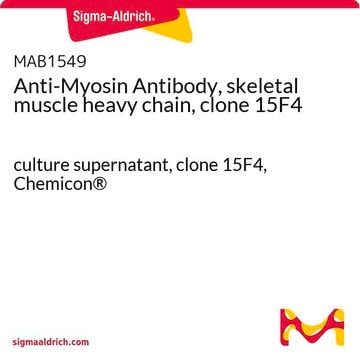05-716
Anti-Myosin Heavy Chain Antibody, clone A4.1025
ascites fluid, clone A4.1025, Upstate®
Synonym(s):
Myosin heavy chain 1, Myosin heavy chain 2x, Myosin heavy chain IIx/d, Myosin heavy chain, skeletal muscle, adult 1, myosin, heavy chain 1, skeletal muscle, adult, myosin, heavy polypeptide 1, skeletal muscle, adult
About This Item
Recommended Products
biological source
mouse
antibody form
ascites fluid
antibody product type
primary antibodies
clone
A4.1025, monoclonal
species reactivity
mouse, zebrafish, rat, Drosophila, rabbit, human
manufacturer/tradename
Upstate®
technique(s)
immunohistochemistry: suitable
western blot: suitable
isotype
IgG
NCBI accession no.
UniProt accession no.
shipped in
dry ice
target post-translational modification
unmodified
Gene Information
human ... MYH1(4619)
General description
Specificity
Immunogen
Application
This antibody has been reported by an independent laboratory to detect myosin heavy chain in zebrafish embryos and skeletal muscle sections fixed with 4% paraformaldehyde in a previous lot (Blagden, C.S., 1997; Cho, M., 1994).
Quality
Western Blot Analysis:
1:1000-1:5000 dilution of this lot detected Myosin Heavy Chain (MyHC) in RIPA lysates from Rabbit skeletal muscle cells.
Target description
Physical form
Storage and Stability
For maximum recovery of product, centrifuge the vial prior to removing the cap.
Handling Recommendations:
Upon first thaw, and prior to removing the cap, centrifuge the vial and gently mix the solution. Aliquot into microcentrifuge tubes and store at -20°C. Avoid repeated freeze/thaw cycles, which may damage IgG and affect product performance. Note: Variability in freezer temperatures below -20°C may cause glycerol-containing solutions to become frozen during storage.
Analysis Note
RIPA lysates from C2C12 cells
Other Notes
Legal Information
Not finding the right product?
Try our Product Selector Tool.
recommended
Storage Class Code
10 - Combustible liquids
WGK
WGK 1
Certificates of Analysis (COA)
Search for Certificates of Analysis (COA) by entering the products Lot/Batch Number. Lot and Batch Numbers can be found on a product’s label following the words ‘Lot’ or ‘Batch’.
Already Own This Product?
Find documentation for the products that you have recently purchased in the Document Library.
Customers Also Viewed
Our team of scientists has experience in all areas of research including Life Science, Material Science, Chemical Synthesis, Chromatography, Analytical and many others.
Contact Technical Service











